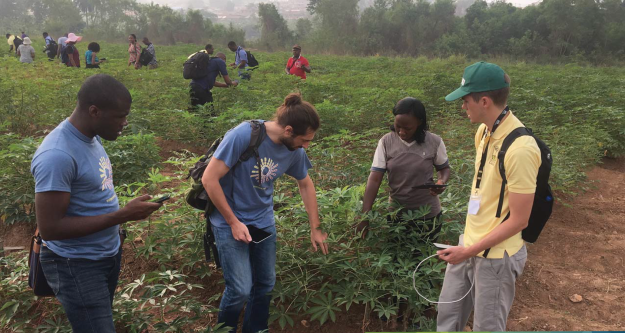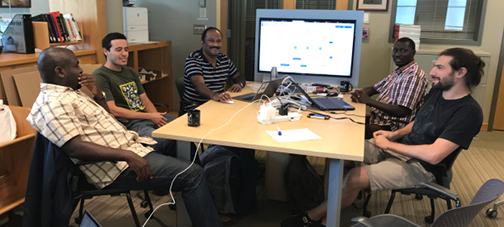What does it take to create and maintain an open-access genomic database? This is the question that faced the Boyce Thompson Institute, which has been a part of the Next Generation Cassava Breeding project since its inception. Over the years, BTI has developed and supported Cassavabase, an open-access online repository for information from cassava breeding trials. More importantly, however, it has also worked to build capacity in database management and development for NextGen Cassava’s African partners.
Team members from BTI make trips to Africa for field work and visits at partner institutions, an important component of the database development. In addition to this, every year, database managers and data analysts from each breeding institute involved in NextGen Cassava come to BTI to exchange information on database management and collaborate on what needs to be developed for Cassavabase. In these month-long stays, the team is able to engage in in-depth, comprehensive collaboration, ensuring that feedback to make sure Cassavabase continues to meet breeders’ needs is incorporated into the code.

Alex Ogbonna, Guillaume Bauchet, Rachel Mukisa, and Bryan Ellerbrock at a workshop during the 2017 annual meeting. Experience from fieldwork at partner institutions is critical to ensuring Cassavabase serves the needs of cassava breeders.
“Having all the database collaborators come together like this lets us discuss data curation and learn from each other,” said Guillaume Bauchet, who works at BTI managing Cassavabase. “The goal is to give autonomy to the teams to run their own databases at their institutions.”
Prasad Peteti of the International Institute of Tropical Agriculture (IITA), who has been coming to these trainings at BTI since the beginning of the project, reflected on how far the team has come. “Initially, we were coming to BTI just to learn about development and maintenance of databases. It was more of a one-way flow of information to gain the fundamentals. Now we are developing our own modules and more functionalities.”
Bauchet added, “At BTI, we actually learn a lot from the data and experiences that our partners bring back from their institutions. We’ve achieved a lot since Phase 1. A big part of that phase was all of the logistical things — getting a server, how to ship and install, and so on. That’s been sorted, so in the last couple of years, we’ve really been able to focus on developing tools responsive to the breeder’s needs instead.”
“Now we’re looking towards how we can make the database more useful and incorporate data from new tools, such as near-infrared spectroscopy (NIRS) into it. Phase 2 will focus more on creating a digital ecosystem with the partner institutes, an emphasis on quality, collecting data from farmers’ fields, and a full integration of genotyping data from field to lab.”
Those who have come to BTI for training include:
Afolabi Agbona and Prasad Peteti of the International Institute of Tropical Agriculture (IITA) in Nigeria
Racheal Mukisa of National Crops Resources Research Institute (NaCRRI) in Uganda
Uba Ezenwanyi of Tanzania Agricultural Research Institute (TARI)
Adeyemi Oloyede of the National Root Crops Research Institute (NRCRI) in Nigeria
Luciana Braatz de Andrade of the Brazilian Agricultural Research Corporation (Embrapa) in Brazil
In addition to the annual training/workshop, the database managers have weekly online meetings with Bauchet and frequently keep in touch with one another. Agbona and Peteti maintain the mirror of Cassavabase on servers hosted at IITA, and provide training to other institutions to help them begin to maintain their own databases.






